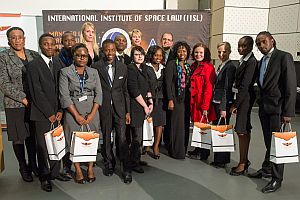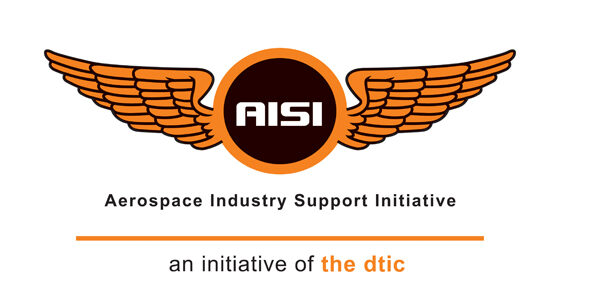
Participants at the Africa Regional Round of the 2012 Manfred Lachs Moot Court Competition with (back, from left) Nomfuneko Majaja, Chief Director: Advanced Manufacturing at the dti; the CSIR’s Marié Botha, AISI programme manager; Prof Erika de Wet, co-director of ICLA; and the CSIR’s Johan le Roux, Group Manager: Strategic Initiatives Implementation Unit. Regional organiser Adv Lulu Makapela is in front (fifth from the left).
The First African Round of the Manfred Lachs Space Law Moot Court Competition was successfully hosted by the University of Pretoria’s (UP) Institute for International and Comparative Law in Africa (ICLA) in May 2012, with four participating universities from South Africa, Nigeria and Kenya. The event was hosted in collaboration with the Aerospace Industry Support Initiative (AISI) of the Department of Trade and Industry (the dti). The AISI is hosted by the CSIR.
A committed team of law students from the Obafemi Awolowo University of Nigeria, won the competition and also took the prizes for best memorial and best oralist. The team was represented by Akintunde Iseoluwa Christopher (best oralist), Olabisi Esther Adeogun, and Maryann Onyinye Nwokolo under the guidance of Dr OA Orifowomo.
The runner-up was the Faculty of Law of UP, South Africa, represented by Sune Crafford, Moremo Matlou, and Tsepho Seloane, under the guidance of coach Lourens Grové, an attorney at the Law Clinic at UP.
The Manfred Lachs Space Law Moot Court Competition is an international competition for law students, and it started in 1992. It is organised by the International Institute of Space Law. Some 48 law schools now compete worldwide in different regional rounds for admission to the final round in October each year, which is held at the annual International Astronautical Congress.
Mount Kenya University, School of Law (Kenya) and North-West University, Potchefstroom campus (South Africa), also took pride in their participation in this highly specialised area of law.
Locking legal horns
The teams were required to debate the problem based on a hypothetical case that was posed for the competition. The case addressed questions related to on-orbit satellite collision, non-cooperative satellite removal and damages.
The problem (the description of which is liberally sprinkled with allusions to William Shakespeare’s plays) relates to events following a collision between two satellites belonging to the Republic of Verona (Juliet-1) and the Commonwealth of Montague (Romeo-22). The case was submitted by the two countries for binding resolution by the International Court of Justice, with each country putting forward its requests to the court.
The preliminary rounds were judged by Mr Kim Gorringe (Head, Compliance and Regulatory Affairs Department, Comair Limited and member of the South African Council for Space Affairs), Adv Phetole Patrick Sekhula (Advocate of the High Court and member of the South African Council for Space Affairs) and Adv Liezel Claassen of the University of South Africa’s Law Department. Favourable comments by these judges attested to the thoroughness of the preparations by the teams as well as their strong performance.
The nail-biting final was held in the august atmosphere of the North Gauteng High Court. Dr Tare Brisibe (Chair, Legal Sub-committee of the United Nations Committee on the Peaceful Uses of Outer Space), Adv Nicole Lewis (Advocate at the Johannesburg Bar) and Adv Luthando Simphiwe Mkumatela (Advocate for the High Court and former Chairperson of the South African Council for Space Affairs) heard the arguments of the opposing teams.
A win for Africa: Capacity building in space regulation
South Africa’s commitment to hosting this first formal Africa Regional Round comes at an auspicious time in the history of space endeavours. Speaking at the dinner held on 17 May 2011 at UP, Nomfuneko Majaja, Chief Director: Advanced Manufacturing at the dti, highlighted the historic nature of the Africa Round, which was coordinated by Adv Lulu Makapela of the CSIR.
Dr Brisibe emphasised the need for international cooperation in the light of new technologies. “Capacity building and training in space law are imperative for African countries to take their rightful place in the arena of current international space activities,” he said. Dr Peter Martinez, Chairperson: South African Council for Space Affairs, echoed these sentiments. “Space activities are ubiquitous and essential to modern life,” he noted. “At the same time, the sustainability of outer space is crowded, contested and complex. This needs to be regulated through international legislation.”
Hosts of the event, Prof Erika de Wet, co-director of ICLA, and the CSIR’s Marié Botha, AISI programme manager, viewed the value of the event in terms of capacity building.
De Wet has invested in this domain through her commitment to developing a specialised Master’s degree (LLM) in space law. With the support of AISI, ICLA held the second annual training seminar on air, space and telecommunications law in 2011.
Read more
About the Manfred Lachs Space Law Moot Court Competition
About Space junk: Why it is time to clean up the skies
